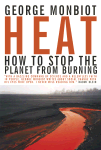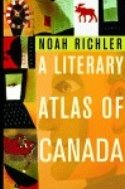
It's offical, I finished this book at work last night! Since I have been posting about it all along, I am just going to post the last few chapters that I have not mentioned before and give it a rating.
Part TWO: THE AGE OF MAPPING
Chapter Six: The Company Store
In which the author reveals Canada in its three stages of work and, blaming the Hudson's Bay Company for much, travels the country from Newfoundland to British Columbia and seeks the counsel of Michael Crummey, Alistair MacLeod, Christy Ann Conlin, Leo McKay Jr., David Adams Richards, Alice Munro, Richard Wright, John Bemrose, Michael Ondaatje, and Michael Turner along the way.
This is the chapter that talked about my province, Nova Scotia. Christy Ann Conlin actually was raised very near to me, and I know people that know her, so this chapter hit very close to home. A lot of great authors, too. Michael Crummey is from Nfld, I have read River Thiefs by him, which was a very good novel. Alistair MacLeod is Nova Scotian, and I have read a lot of his short stories, but not his novel. Christy Ann Conlin has a novel called Heave which is really good, I got lots of people to read it back when it came out. Leo McKay Jr., I have not read before, but he is from Nova Scotia too. He talks about, in this chapter, where my boyfriend is from, so I could understand where he was coming from. David Adams Richards is from New Brunswick, and I have mentioned him before. Alice Munro, is a fantastic short story writer from Ontario. John Bemrose, I have Island Walkers, but haven't read it yet. I have, of course, read Michael Ondaatje, but never read Michael Turner. All in all, a good chapter.
Chapter Seven: Traces
In which the author meets writers of Saskatchewan's diaspora living in Toronto, the novelists Lee Gowan and Michael Helm and the poet Karen Solie, and then travels to the praire province itself, where he meets with Guy Vanderhaeghe, Jacqueline Baker, Martha Blum, Yann Martel, Michael Hetherton, Sharon Butala, and Gloria Sawai and discovers a land of ardour, subleties, and passages.
This chapter made me think of the fact that we are the second largest land mass, but have a very small population. This chapter, as well as others, shows why very well. Small farmers can no longer compete against the larger farms, so farmers are forced to struggle or give it up for another career. In this chapter, some of the authors go back to the farms that they were raised on, that has been in the family for a couple generations, but was not worth holding on to anymore. The last chapter talks about this too. A mine or something will be found, people will move in and make a town, but then everything dries up and suddenly, you have a ghost town. This is why Canada is so barren, well, that and that there are places where it is not practical to live anyways, because settlements set up where the money is, no money, ghost town.
Chapter Eight: Our Myths of Disappointment
In which the author ponders the importance of myths to all societies but decides that many of the nationally binding stories that Canadians tell themselves are insalubrious and reflect our distrust of authority, for good reason, and seeks out Ruby Wiebe, Guy Vanderhaeghe, Jack Hodgins, Joseph Boydon, Gil Gourtemanche, Wayne Johnston, and Antoinette Maillet, wishing, in some part of himself, that his notion is batty.
This is where my province comes in again, Richler looks at whether or not the Acadian deportment would be considered a part of this category. Antoinette Maillet, another one of those authors residing on my TBR pile, is an Acadian that has written novels about them. I actually found the book I had by her after reading this chapter, so I can read it soon.
PART THREE: THE AGE OF ARGUMENT
Chapter Nine: Making Things Up
In which the author travels to St. John's, Newfoundland, where he is received by Robin McGrath before gathering the novelists Michael Crummey, Lisa Moore, Michael Winter, and some friends of theirs in the convivial surroundings of the Ship Inn, discovering their new-found confidence as well as their plundering of life, and confronts them with ethical issues that pertain to all writers of fiction.
This chapter has some funny stories in it, a very enjoyable chapter. It looks at whether there really is fiction, or if things are really just the life of the authors rewritten.
Chapter Ten: Je me souviens - do quoi?
In which the author travels to Trois-Pistoles, in la belle province, wanting to converse with the separtist author Victor-Levy Beaulieu, eminece tres tres grise, and then descends to Montreal, where he invites the novelists Nadine Bismuth, Mauricio Segura, and Guillaume Vigneault to a long lunch, and asks them and Gil Courtemanche, Rawi Hage, Elise Turcotte, and Gaeton Soucy about the role of the novel in Quebec's distinct society.
This is Quebec's chapter. In a time when Quebec wants to separate from the rest of Canada, this chapter was very interesting to read. I have to admit, I have not really heard of any of these authors, and those I have, never read before. So, this was a whole new learning experience for me. Now you know why I want to read some more Canadian authors, I am missing a lot of key ones.
Chapter Eleven: Home and Away
In which the author considers the changed nature of Toronto, the significance to the country of the events of the 1960s, and approaches an understanding of some of the ways in which Canada is "home," in the company of Russell Smith, Richard Wright, Austin Clarke, Barry Callaghan, George Elliott Clarke, Ann-Marie MacDonald, Michael Ondaatje, Katherine Govier, Dionne Brand, and Rohinton Mistry in Toronto; Madeleine Thien and Anosh Irani in Vancouver; and Yann Martel in Saskatoon.
The last chapter in the book, I have to admit, I was sad to see this book come to an end. I really enjoyed reading it. This chapter is particularly interesting because it looks at Canada as home. Many of these authors came from somewhere else, and it discusses where they see themselves and how it influences their writing. A great list of authors, some I have read and others that I really need to.
Concluding Remarks:
I could have finished this book long ago, but I decided to read it slowly and not rush through the experience. It really is an interesting look at Canada, the country that I call home, and I learned a lot. It is the sort of book that I will be reading again. It also has reawakened an interest in non-fiction that university sort of destroyed. I suggest this book to both Canadians and outsiders that want to know more about this large country. Now I need to find something else to post about!
5/5 - Could I really give it anything less?
More looks at this book.
To look into getting this book, click here
Also, Noah Richler is the son of one of Canada's finest authors, and it looks like one of his books just got rereleased. To see Mordecai Richler's book rerelease, click here. This is the only book I have read by him.



